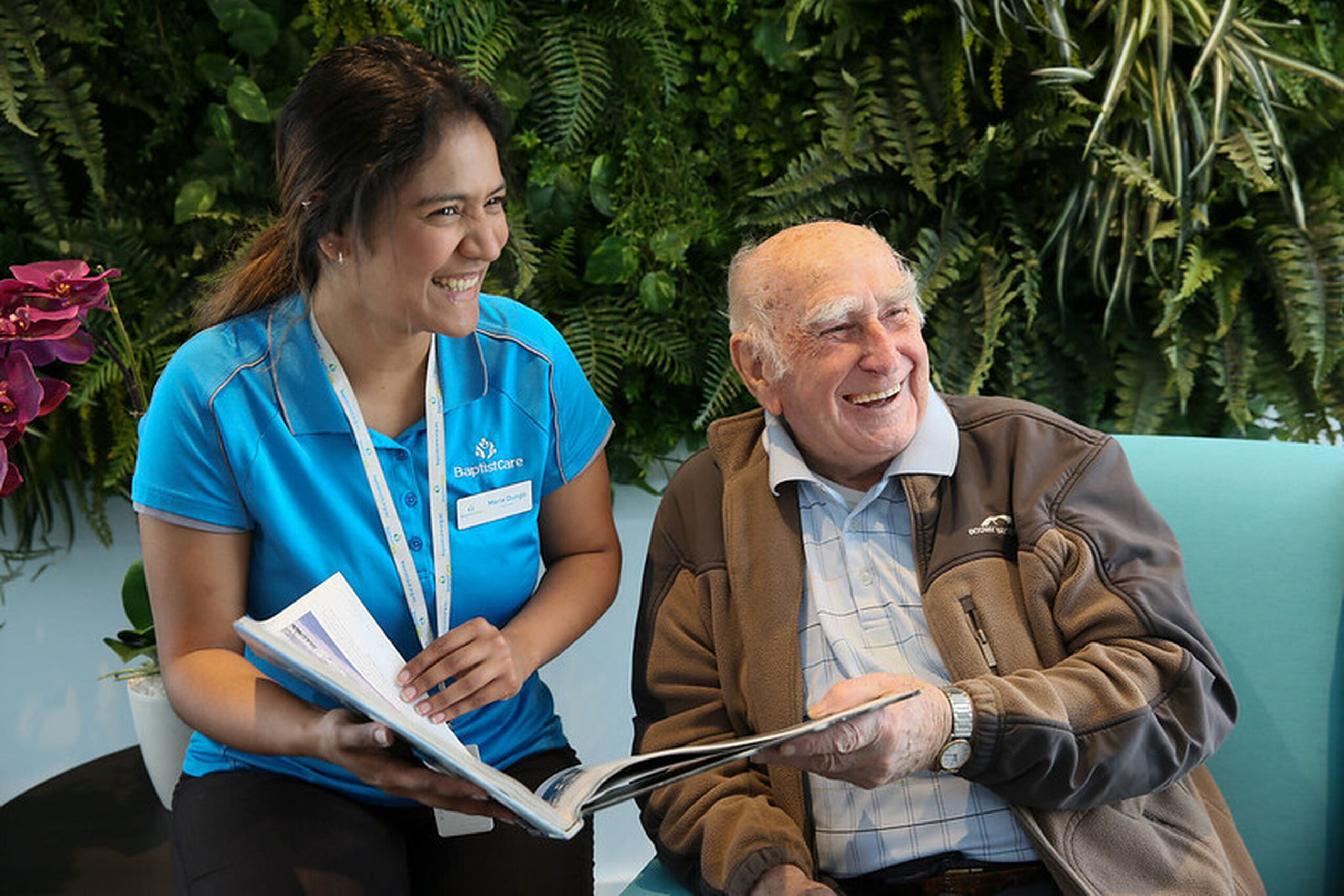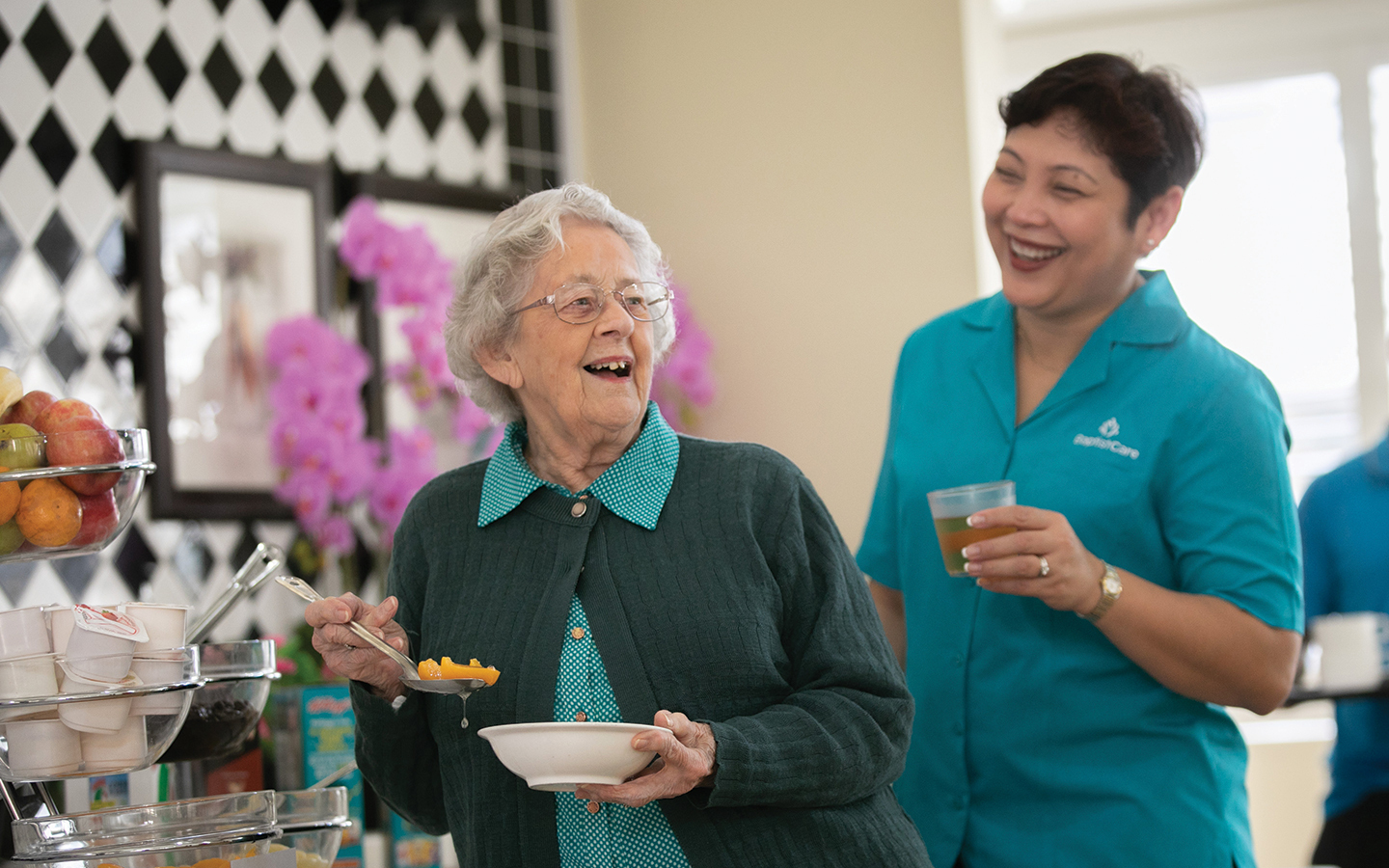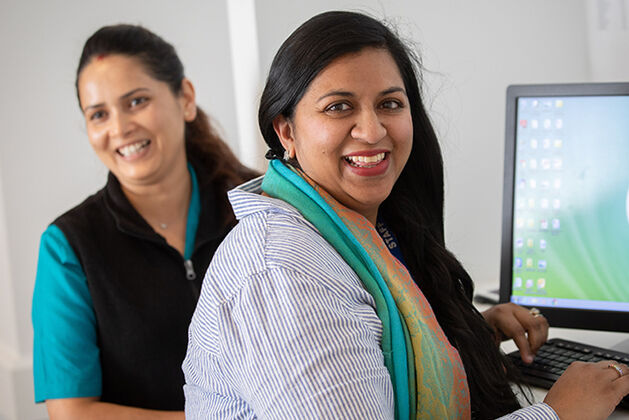An insider’s guide to job opportunities in residential aged care
Offering a broad range of exciting job opportunities under one roof, long-term stability, and a supportive, close-knit team environment, residential care homes are a uniquely rewarding place to work.
Scroll to Explore

28 February 2023
Stories
| Aged Care Homes
Offering a broad range of exciting job opportunities under one roof, long-term stability, and a supportive, close-knit team environment, residential care homes are a uniquely rewarding place to work.
Cleaners, chefs, gardeners, and roster clerks are just some of the roles you might not have thought about when it comes to aged care.
However, residential aged care facilities rely on a multitude of skill sets, not just from those providing hands-on care; which all play a part in quality care service delivery.
 | To explore the wide breadth of opportunities, we spoke to Renata Motta, a recruitment expert at BaptistCare. Having worked for many years as a front-line aged care worker herself, Renata is a true industry ‘insider,’ sharing with us her expertise and broad experience in residential aged care. |
Jump to:
What is residential aged care?
Residential aged care provides ongoing, 24/7 support to older people living in a home-like care facility. Residents are often living with higher care needs, such as advanced dementia, and may need assistance with everyday tasks like eating, bathing, or exercising.
‘It’s all about creating a home-like environment where residents can feel safe and comfortable,’ says Renata.
Residential aged care facilities in Australia typically house anywhere from 30 to over 100 residents, with some larger facilities accommodating up to several hundred residents. Regardless of their size, care homes require a multi-skilled workforce to adequately serve the resident community.
Residential aged care, sometimes referred to as a nursing home, is one of two primary care services for elderly people in Australia, with the other being in-home care. You can learn more about the differences in career paths between the two, here.
What’s so special about a career in residential aged care?
Regardless of the role you play in residential aged care, there are several universal benefits to working in a care home, which Renata explains further:
Long-term security
‘People are generally living longer these days with ongoing improvements in healthcare,’ says Renata, ‘meaning more of our older generations are going to require residential care in the years to come.’
In fact, the aged care sector is one of Australia’s fastest-growing industries. According to the Australian Bureau of Statistics, most of us can expect to live well into our eighties, with the number of older adults requiring care set to double by the year 2050.
This level of growth means that aged care workers in all roles can enjoy long-term job security, with no shortage of work for the foreseeable future.
Opportunities for growth
The variety of jobs in residential aged care also means that there’s plenty of room for professional development.
‘It’s hard to get bored in residential aged care,’ says Renata. ‘Not only is there room to move sideways or upwards into roles that interest you, there is also plenty of overlap in tasks, which only widens your experience.’
It’s not uncommon, for example, for a member of a catering assistant to sit down with a resident and lend a caring ear, or for a care worker to help out in the kitchen. Care home teams are often close and work hard to support each other when the days get busy.
‘This kind of environment means that you’re always learning new skills,’ explains Renata. ‘It keeps things interesting.’

Rewarding work
There aren’t many work environments where you get to support people over an extended period of months or years, getting to know them well and forming close relationships.
‘It can sometimes feel like you’re working amongst family,’ says Renata. ‘You get to know the residents, and the residents get to know you – often asking about your own life. There really isn’t any other job that offers that kind of close, long-term connection.’
Many residential aged care staff - regardless of their role - find this aspect of the job incredibly rewarding, getting to know residents and witnessing the way their own day-to-day work improves the quality of residents’ lives.
Supportive teams
And this sense of connection often extends to colleagues. ‘I know many people who have formed life-long friendships through residential aged care,’ Renata told us.
It’s a phenomenon that carries across industries that deal with deeper issues such as end-of-life care, bringing about closer, deeper bonds amongst colleagues, and adding to their overall sense of job satisfaction.
‘Aged care teams are also beautifully diverse and multicultural,’ Renata says. ‘It’s wonderful to come together as a team and celebrate one another’s cultures – and this often carries into resident activities too.’
What jobs are available?
To help you explore the many opportunities in residential aged care, we’ve grouped them into categories so you can browse according to your interests:
What qualifications are required?
Many of the roles in residential aged care, such as maintenance, gardening, or kitchen staff, are recruited with a focus on prior relevant experience and transferrable skills.
Workers who provide hands-on care are required to have a Certificate III in Individual Support, and there are fully funded traineeships available to support those who are keen to learn on the job.
BaptistCare is very proud to be the first aged care provider in NSW to offer such a program, giving eligible applicants the opportunity to undertake our traineeship through TAFE NSW via a supported, online course, complemented by fully supervised on-the-job training. Most people usually complete the traineeship within eight months, moving into a formal care worker role shortly afterward.
Work for an award-winning organisation
By choosing to work for BaptistCare, you would be joining one of Australia’s largest and most trusted providers of aged care, proudly delivering loving, respectful, and reliable care to thousands of people across NSW and the ACT.
Our staff are the heartbeat of BaptistCare, living out our values of Love, Respect, Reliability, and Empowerment in the amazing work they do each day.
BaptistCare was ranked 10th best place to work in the 2022 Australian Financial Review BOSS list under the Government, Education & NFP category and, in November 2022, we were one of only 30 organisations recognised by Diversity Council Australia as an Inclusive Employer 2022-23.

Find aged care jobs near me
Join us! Apply for an aged care job with BaptistCare in four easy steps:
1. Search for a job at BaptistCare via our current job opportunities page
2. Sign in or create an account in minutes
3. Complete your application - Upload your résumé and supporting information or apply using your up-to-date LinkedIn or SEEK profile
4. Confirm, review, and submit
We will email a confirmation acknowledging that your application has been submitted. Our Talent Team will review your application and will advise you of the outcome via email or phone.